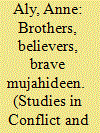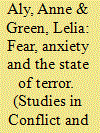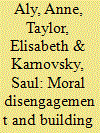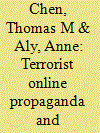| Srl | Item |
| 1 |
ID:
156148


|
|
|
|
|
| Summary/Abstract |
The exponential growth in the use of the Internet and social media by terrorist actors and violent extremists has generated research interest into terrorism and the Internet. Much of this research is focused on the kinds of messages being spread via the various media platforms that host violent extremist content. This research has yielded significant insights into how organizations such as Al Qaeda and Islamic State craft their messages, the mediums they use to disseminate their messages, and the ways in which they reach their audiences. Yet we are still no closer to understanding why certain messaging appeals to certain people in certain ways and not to others. Within the literature on terrorism and the Internet, the audience—those individuals who receive messages, make meaning from them and then decide whether to act on them—is conspicuously missing. As a result, research into terrorism and the Internet can only hypothesize about the nature and extent of influence that terrorist messages wield. It is often based on an assumption that the violent extremist narrative works like a magic bullet to radicalize audiences already vulnerable and predisposed to becoming violent. Utilizing media theory approaches to studying the audience as an active agent in meaning-making, this article proposes a research framework for developing the current focus on terrorism and the Internet.
|
|
|
|
|
|
|
|
|
|
|
|
|
|
|
|
| 2 |
ID:
116218


|
|
|
|
|
| Publication |
2012.
|
| Summary/Abstract |
In this article, the authors apply the four-phase radicalization model proposed by Silber and Bhatt 1
to a case study of Australia's first convicted terrorist, Jack Roche, based on communication with Roche after his incarceration and on a qualitative analysis of his trial. In doing so, they examine the validity of the four-phase model to a case of "home grown" terrorism and dissect the role of religion in the radicalization process. To conclude, the authors find that religion plays a far lesser role in radicalization toward violent extremism than the policy response contends and this has implications for counterterrorism programs that aim to address the drivers of violent extremism.
|
|
|
|
|
|
|
|
|
|
|
|
|
|
|
|
| 3 |
ID:
094848


|
|
|
|
|
| Publication |
2010.
|
| Summary/Abstract |
The 11 September 2001 terrorist attacks on the World Trade Center and the Pentagon marked the advent of an unprecedented preoccupation with terrorism. Although Australia's actual terrorist risk profile remains marginal in comparison with other mortality risks, in times of crisis, the reasoned negotiation of risk is marginalised. Drawing on the findings of qualitative research, this article offers an analysis of how Australians are responding to the threat of terrorism embodied in a developing discourse of the war on terror and how they construct their perceptions of terrorist risk. The findings implicate community fear as a factor that should be considered in the development of counter terrorism strategies that emphasize community engagement as a mechanism for challenging radicalisation in democratic states.
|
|
|
|
|
|
|
|
|
|
|
|
|
|
|
|
| 4 |
ID:
132178


|
|
|
|
|
| Publication |
2014.
|
| Summary/Abstract |
This article reports on the development of an education intervention, the Beyond Bali Education Resource funded by the Australian Governments' Building Community Resilience Grants of the Federal Attorney General's Department, that applies a conceptual framework grounded in moral disengagement theory. Beyond Bali is a five module program for schools that is specifically designed to build social cognitive resilience to violent extremism by engaging self-sanctions and preparing students to challenge the influence of violent extremism that can lead to moral disengagement. The theory of moral disengagement has been applied to the study of radicalization to violent extremism to explain how individuals can cognitively reconstruct the moral value of violence and carry out inhumane acts. The mechanisms of moral disengagement through which individuals justify violence, dehumanize victims, disregard the harmful consequences of violence and absolve themselves of blame have been used in the construction of violent extremist narratives. However, they have not been applied to the development of intervention strategies that aim to counter the radicalizing influences of violent extremist narratives.
|
|
|
|
|
|
|
|
|
|
|
|
|
|
|
|
| 5 |
ID:
156144


|
|
|
|
|
| Summary/Abstract |
The Internet is a transformative technology that terrorists are exploiting for the spread of propaganda and radicalizing new recruits. While Al Qaeda has a longer history, Islamic State is conducting a modern and sophisticated media campaign centered around online social networking. This article introduces and contextualizes the contributions to this Special Issue by examining some of the ways in which terrorists make use of the Internet as part of their broader media strategies.
|
|
|
|
|
|
|
|
|
|
|
|
|
|
|
|